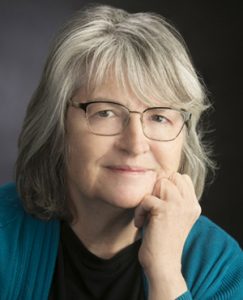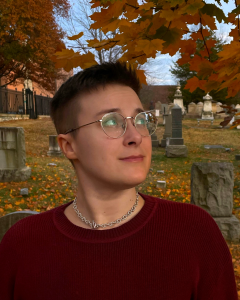In the first Meet Our Members Interview, Stevie Billow interviews Connie Senior
Stevie: To start, I’d love to hear about one of the first stories you ever wrote! Can you tell us a bit about “The Haunted Space Station”?
Connie: I wish I remembered the details! I remember the title and that’s about it. I’ve been interested in speculative fiction for a very long time. I still have a hand-illustrated, Tolkien-esque epic I wrote in fifth grade. The tagline that I use for my website is “stories leak into my head, and I collect them for you.” That sums up my childhood.
Stevie: You’ve been a writer since childhood, but what other professions have you had?
Connie: I took a long detour from writing fiction to study engineering. I have a BS in Chemical Engineering and a PhD in Environmental Engineering Science. My LinkedIn profile has the details. I worked for 35 years in the general area of research and development related to air pollution control. Throughout that time, I did a lot of technical writing (publications, grant applications, reports). I came to appreciate the importance of clarity in writing. (Writing a grant proposal is a lot like writing fiction; you must know who your reader is, you must not distract the reader with incomprehensible prose, and you must create in the mind of the reader an idea that does not yet exist.) For the past seven years I’ve been the Executive Editor-and-Chief of an academic journal called Clean Energy. This keeps me up to date about what’s happening in the energy space. Also, the journal employs copy editors, so I don’t have to do that!
Stevie: On your website, you mention the role fanfiction played in your development as a writer. Can you expand upon this and share with us how you transitioned from fanfiction to writing fiction?
Connie: Circa 2000, I got the itch to write fiction again. Not that I had a lot of spare time with a full-time job and two elementary-school-age children. But that itch is hard to resist. I can’t remember how I stumbled onto fanfiction, but I enjoyed reading fantasy books as bedtime stories to my children, like Lord of the Rings, the Oz books, and the Harry Potter books. I started publishing short stories in the Harry Potter fanfiction realm, which turned out to be a lot of fun. There is something addictive about posting a story and getting feedback (in the form of online reviews) right away. I also made good friends in that community. For a while I was a moderator at a fanfiction site. After a few years, I felt I’d accomplished as much as I wanted with fanfiction, but I had lots of ideas that I’d developed and wanted to see if they could “live” in the world outside that community. It took me ten years to get those ideas into my first book.
Stevie: What writers or specific works have most influenced the way you write now?
Connie: I’m drawn to speculative fiction with a dry and dark sense of humor. In that area, a few of my favorite authors are Terry Pratchett, Neil Gaiman, and Jeff VanderMeer. I’ve always loved the noir-side of detective fiction, such as Gorky Park by Martin Cruz Smith, The Yiddish Policemen’s Union by Michael Chabon and everything by Dashiell Hammett and Raymond Chandler. I would call the current novel that I am writing a “werewolf detective novel” with those roots.
Stevie: What writing project(s) are you currently working on?
Connie: I’m currently in about the third draft (it’s hazy, the line between drafts) for the third book in my fantasy trilogy, which will be called Blue Moon. At this point, I think it will be published in the second half of 2026, though there is much work to be done to get there.
Stevie: What inspired you to write Only the Moon Howls, the first book in your fantasy trilogy?
Connie: I was struck by the dilemma of the werewolf character in the Harry Potter books, imagining how a werewolf might struggle with their dual human and animal identity. So I sent a college-educated werewolf from America off to the mountains of Transylvania to run with wild werewolves and fight vampires.
Stevie: Do you have any rituals that assist in your writing process? For example, do you play music while you write or go for long walks to reflect on a piece’s plot?
Connie: Most of the time during which I worked on the first two books in the trilogy, I juggled work and children and writing, so I had no practice or rituals. As my children grew up and left home, I devoted more time to writing. Currently, I try to write every day, first thing in the morning. I find that later in the day my mind is too crowded with the myriad details of work and life. I’m an obsessive counter of things, like how much time I spend writing and word count. I’m fortunate to have a flexible job (now part-time) which allows me to write for 2-3 hours each morning. For Blue Moon, the current project, I created a playlist on Spotify that contains songs which follow the narrative action or signify certain characters. (There are a LOT of songs about werewolves.) Listening to that puts me in the world of the story.
My books are set in the “real” world, or a world a lot like ours, but with supernatural elements. I do a lot of research on locations in the books, visiting as many as I can and taking pictures. (Alas, I have not been to Romania yet.) Seeing the locations sparks ideas for what characters will encounter or for subplots.
Stevie: So far, you’ve written and published two full-length fantasy novels as part of your Club and Fang trilogy. Do you have any advice for writers hoping to complete their own novels? Any specific wisdom for aspiring fantasy authors?
Connie: The first piece of advice is finish something. Nothing will happen if you don’t finish a draft, and then revise it, and then revise it.
For fantasy writers, I’d also say that following wild ideas, chasing them down and making them live on the page, is so important. I think about subplots or characters that started as a niggling idea in the back of my mind, the sort that I might at some point dismiss as silly or unworkable, but pursuing such niggles led me down interesting paths.
Although writing is a solitary practice, writers benefit from a community. My fiction is so much better because of the many writers with whom I talk about writing or exchange writing pieces. Having a community to share writing and ideas helps keep me going when I’m stuck.

